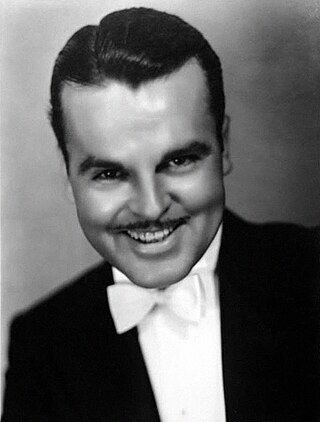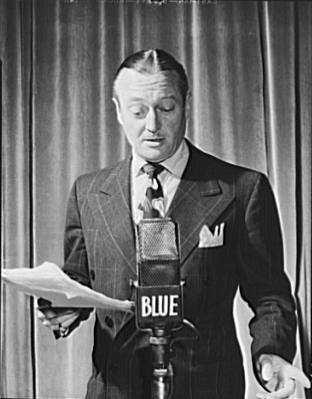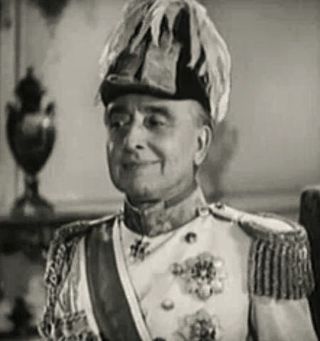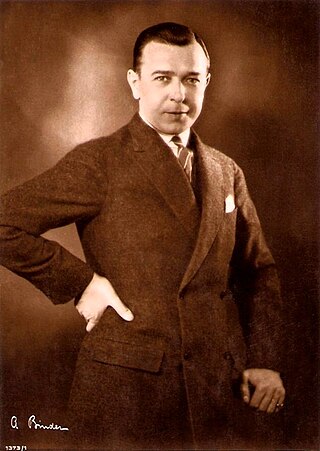Related Research Articles
The Pomp and Circumstance Marches are a series of five marches for orchestra composed by Edward Elgar, together with a sixth march created from sketches. The marches were dedicated to his friends including composer Granville Bantock and organists George Robertson Sinclair, Ivor Atkins and Percy Hull.

Walter James Redfern Turner was an Australian-born, English-domiciled writer and critic.

James Neil Hamilton was an American stage, film and television actor, best remembered for his role as Commissioner Gordon on the Batman TV series of the 1960s, having first played a character by that name in 1928's Three Week-Ends. During his motion picture career, which spanned more than a half century, Hamilton performed in over 260 productions in the silent and sound eras.
The Our Gang personnel page is a listing of the significant cast and crew from the Our Gang short subjects film series, originally created and produced by Hal Roach which ran in movie theaters from 1922 to 1944.

William H. Daniels ASC was a film cinematographer who was best-known as actress Greta Garbo's personal lensman. Daniels served as the cinematographer on all but three of Garbo's films during her tenure at Metro-Goldwyn-Mayer, including Torrent (1926), The Mysterious Lady (1928), The Kiss (1929), Anna Christie (1930), Grand Hotel (1932), Queen Christina (1933), Anna Karenina (1935), Camille (1936) and Ninotchka (1939). Early in his career, Daniels worked regularly with director Erich von Stroheim, providing cinematography for such films as The Devil's Pass Key (1920) and Greed (1924). Daniels went on to win an Academy Award for Best Cinematography for his work on The Naked City (1948).

Percy Reginald Lawrence-Grant was an English actor known for supporting roles in films such as The Living Ghost, I'll Tell the World, Shanghai Express, The Mask of Fu Manchu and Son of Frankenstein. He was host of the 4th Academy Awards ceremonies in 1931.

Edmund Sherbourne Lowe was an American actor. His formative experience began in vaudeville and silent film.

Montagu Love was an English screen, stage and vaudeville actor.

Alonzo M. "Lon" Poff was an American film actor who appeared in almost 100 films between 1917 and 1951.

Sir Hugh Percy Allen was an English musician, academic, and administrator. He was a leading influence on British musical life in the first half of the 20th century.
Arthur Henry Fox Strangways was an English musicologist, translator, editor and music critic.

Ferdinand Gottschalk was an English theatre and film actor. He appeared in 76 films between 1917 and 1938. He was born and died in London, England.

John Stepan Zamecnik was an American composer and conductor. He is best known for the "photoplay music" he composed for use during silent films by pianists, organists, and orchestras.
John Francis Toye was an English music critic, teacher, writer and educational administrator. After early efforts as a composer and novelist, and service in naval intelligence in World War I, he became music critic of The Morning Post from 1925 to 1937, which he combined with teaching singing and working as managing director of the Restaurant Boulestin in London.

Georg Alexander was a German film actor who was a prolific presence in German cinema. He also directed a number of films during the silent era.
Henry Cope Colles was an English music critic, music lexicographer, writer on music and organist. He is best known for his 32 years as chief music critic of The Times (1911–1943) and for editing the 3rd and 4th editions of Grove's Dictionary of Music and Musicians.
Frederick William Wadely OBE FRCO was an English organist and composer.

Charles Kenneth Thomson was an American character actor active on stage and on film during the silent and early sound film eras.
Willi Herrmann (1893–1968) was a German art director.
Robin Humphrey Legge was an English music writer, the chief music critic of The Daily Telegraph between 1906 and 1931, often writing under the pen name Musicus.
References
- ↑ Annals of the City of Norwich School
- 1 2 3 H.C.Colles (rev. Peter Platt. Basil Maine, Grove Music Online, 2001
- ↑ Nicholas Shakespeare. Ian Fleming: The Complete Man (2023), p.48
- ↑ The succession of organists at Durham Cathedral
- ↑ Landon Ronald. Who's Who in Music (1935), p. 184
- ↑ Dagger Speech from Macbeth, read by Basil Maine, Parlophone E967, 1930
- ↑ Maine, Basil.The Critic and the Actor, in The Sackbut; London Vol 7, April 1927, p 268-270
- ↑ Burn, Andrew. Morning Heroes, Notes to Chandos CH5159 (2015)
- ↑ Who's Who in Music, first post-war edition (1949-50), p. 137
- ↑ Musical Times No 1026, 1 August 1928, p 714
- ↑ Reviewed in The Musical Times No 1085, July 1933, p 608
- ↑ Our Ambassador King
- ↑ Reviewed by "S.B." in Music & Letters Vol 38 No 3, 1957, p 284–285